

Apr 21, 2025
What is AI as a Service & 7 Best Platforms to Accelerate Innovation
Inference Research
Over the past few years, artificial intelligence has emerged as one of the most critical technologies that impact businesses in a generation. But for all of the excitement around AI, few companies have the resources to develop cutting-edge AI systems in-house. Instead, they are turning to AI as a Service solutions to reduce costs, streamline operations, innovate, and gain a competitive edge. AI as a Service provides businesses with access to advanced AI capabilities through APIs and other tools without the complexity of building the systems themselves.
In this blog, we'll explore AI as a Service, also known as AI in the Cloud, and discuss its benefits and applications. We'll also introduce Inference's AI inference APIs as a valuable tool to help you achieve your objectives, including leveraging AI to drive innovation and reduce costs without the complexity of in-house AI development.
What is AI as a Service (AIaaS)?

AI as a Service (AIaaS) is a cloud-based model that allows businesses to incorporate AI capabilities into their operations on demand. The service is offered by third-party vendors that maintain the infrastructure, so organizations don’t have to invest resources to build and implement AI tools independently. AIaaS provides a low-risk and cost-effective model for businesses looking to automate processes and improve business functions.
How Does AI as a Service Work?
AI as a service works like other cloud-based models, providing users with AI functionality over the Internet. Instead of downloading AI software or installing a program locally, businesses can access AI tools hosted on the cloud through a web browser.
This eliminates the need for in-house infrastructure and allows organizations to scale AI capabilities to fit their unique operational needs.
7 Types Of AI As A Service And The Problems They Solve

1. Bots: The Conversationalists of AI Tools
Bots have taken over the internet. Nowadays, regardless of whether you search the web for anything from government websites to clothing stores, you likely come across bots, particularly their most common type, i.e., chatbots. They use Natural Language Processing (NLP) algorithms to emulate natural conversations between humans. These bots are used primarily for customer service and provide relevant answers to customers’ most recurring questions.
As they respond on a 24/7 basis, they save time and resources, allowing employees to focus their time on more complex tasks. One of Europe’s fastest-growing parcel companies, InPost, has recently reported automating as many as 92% of the millions of customer conversations it handles yearly through leveraging a chatbot.
2. APIs: The Middlemen of AI
An API (Application Programming Interface) is the software “middle-man” that allows two applications to communicate. An example of this would be a third-party airline booking website such as Expedia, CheapOair, or Kayak, which all pull information from a collection of airline databases to present all their deals in one place, in a readable manner.
Common uses for APIs also include:
- Natural Language Processing:
- Sentiment
- Urgency analysis
- Computer Vision Conversational AI
3. Machine Learning: Letting the Algorithms Do the Work
Companies use Machine Learning (ML) to analyze and find patterns within their data. As a result, it makes predictions they weren’t explicitly taught to do, learning as the process evolves. This method of data analysis is meant to be run with little to no human intervention. In AIaaS, companies can manage Machine Learning without particular technical expertise. Many solutions range from pre-trained models to building one to perform a custom task (just don't forget the rule of thumb!).
4. Data Labeling: The Key to Organized Data
Data labeling is the process of annotating large quantities of data to be organized efficiently. It has a wide range of use cases:
- Assuring data quality
- Categorizing it by size
- Further training your AI
In the latter, human-in-the-loop (which we mentioned earlier in this post) labels data so that AI can easily evaluate it in the future.
5. Data Classification: Putting Data in Its Place
Data classification is when data gets tagged under one or more categories. The classifications usually include:
- Content-based
- Context-based
- User-based
Data can be classified on a larger scale using artificial intelligence, provided a data classification outline and criteria are clearly defined.
6. No-Code or Low-Code ML Services: Building AI Without the Coding Headache
Some AIaaS platforms have no-code or low-code ML tools, where a visual interface lets users build models without writing computer code.
How it should work: The entire process is automated from data collection to deployment, using pre-built algorithms to train ML models.
What to expect from it: It is an easier way to adopt AI, as it requires very little hands-on effort.
7. Data Classification: More Than One Level of Organization
Data classification further categorizes data into different types. Structured and unstructured data are tagged based on:
- Content
- Context
- User characteristics
When to use it: If you need to classify different types of documents, customer data, images, or other information.
How it should work: Once your business creates classification outlines and criteria, AI automatically categorizes data into separate classifications.
What to expect from it: Data categorizing organizes information more effectively and can help refine business operations.
Related Reading
- Model Inference
- AI Learning Models
- MLOps Best Practices
- MLOps Architecture
- Machine Learning Best Practices
- AI Infrastructure Ecosystem
5 Benefits of Using AIaas Platforms

1. No Need for Sophisticated Tech Skills
AI as a service is accessible even to organizations that do not have an AI-skilled programmer on board. Companies that genuinely provide AIaaS often do not require coding or tech skills at any point in the setup process. In a piece for Forbes, Daniel Newman of Broadsuite Media Group aptly notices that “in a time when there’s a shortage of AI experts and ever-increasing competition in the marketplace, that’s a huge workaround”.
It’s important to underline that while some AIaaS solutions do not require coding skills, the level of implementation complexity varies greatly when we enter the world of legacy software.
2. Advanced Infrastructure - And Fast
Before AI as a Service, strong and fast GPUs were required to run successful AI and Machine Learning models. Most SMEs don't have the resources and time to develop software in-house. In the world of AI, there are a few rules of thumb - one is that your model will only perform well in a task if the data it's been fed is of good quality.
AIaaS, being customizable, will offer the opportunity to build a specific task-oriented model on top of the abundance of data most organizations sit on top of already. “The worldwide AIaaS market will be valued at just a shade under $11 billion by the end of 2023, with the 2017-2023 CAGR hovering around the 49% mark.” - Hussain Fakhruddin, the CEO of Teksmobile
3. Transparency
Not only does AI as a Service give you access to AI while cutting back on non-value-added labor, but there is also a significant amount of transparency. AI as a Service allows you to pay per usage. Machine Learning requires much computing power, but most pricing models focus on usage.
Some platforms allow the user to have more control over AI automation. One way to do this is to add humans in the loop as an option. HITL is a continuous feedback loop where the process owners give AI feedback in edge cases. The feature aims to achieve what neither a human being nor a machine can achieve.
4. Usability
Most as-a-service platforms are not as user-friendly as they'd like to make it sound. Although many AI options are open-sourced and can be downloaded, modified, and used freely, they can be challenging to install and develop. AI as a Service, on the other hand, is, in most cases, entirely ready for use.
Process owners can utilize AI software without any formal training. End-to-end ML services include both pre-built models and custom-created models, as well as drag-and-drop interfaces for reduced complexity. The cool thing about this? Getting your ML project started within hours without engineers.
5. Scalability
AI as a Service is built for scaling. If you've trained your model to classify your info based on email urgency or sentiment and funnel the right emails to the right person, you're already ahead of the game. AI as a Service is perfect for performing tasks that require some level of cognitive judgment but where the task itself is not value-adding.
Inference: Cost-Effective Serverless AI Inference for Developers
Inference delivers OpenAI-compatible serverless inference APIs for top open-source LLM models, offering developers the highest performance at the lowest cost in the market. Beyond standard inference, Inference provides specialized batch processing for large-scale async AI workloads and document extraction capabilities designed explicitly for RAG applications. Start building with $10 in free API credits and experience state-of-the-art language models that balance cost-efficiency with high performance.
Top 16 AIaaS vendors
1. Inference: A Cutting-Edge AIaaS Provider for Inference Operations

Inference delivers OpenAI-compatible serverless inference APIs for top open-source LLM models, offering developers the highest performance at the lowest cost in the market. Beyond standard inference, Inference provides specialized batch processing for large-scale async AI workloads and document extraction capabilities designed explicitly for RAG applications.
Start building with $10 in free API credits and experience state-of-the-art language models that balance cost-efficiency with high performance.
2. Levity: The Next Generation of AI-Assisted Document Processing

A solution like Levity is, in essence, what AIaaS should be about – to get started, you define your workflow, upload sample data, train the custom AI, and let it learn and refine itself. Initially, the tool will ask you for input when it’s uncertain about tackling an issue, but it’s designed to relieve you of mundane work over time.
While some basic AI knowledge will be helpful to, Levity doesn’t require you to be an expert. The tool aims “to deliver an intuitive and guided experience in all aspects – including what you need to know about AI”. Highlights Fully customizable document, image, and text classification Integrates with hundreds of tools
3. Odus: The AI Chatbot That Learns to Communicate Like a Human
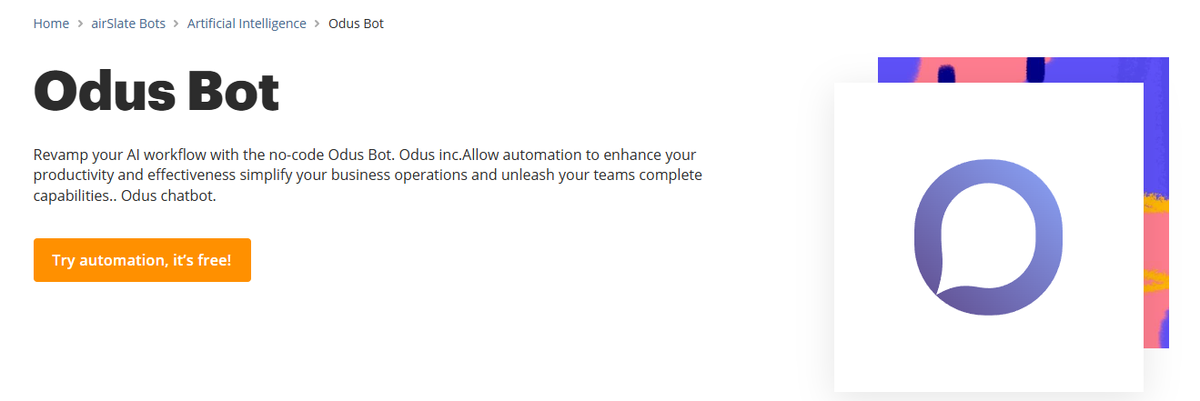
Odus is a chatbot that provides automated messages and calls with a human-like AI. The chats are fully automated and can work entirely on their own. Odus has a user-friendly, no-code approach, making managing it simple even for those without tech skills.
Highlights:
- Provides call and written communication automation
- Fast integration with a variety of other tools
- Offers complex scenarios with entities
4. Viz.ai: AI for Healthcare
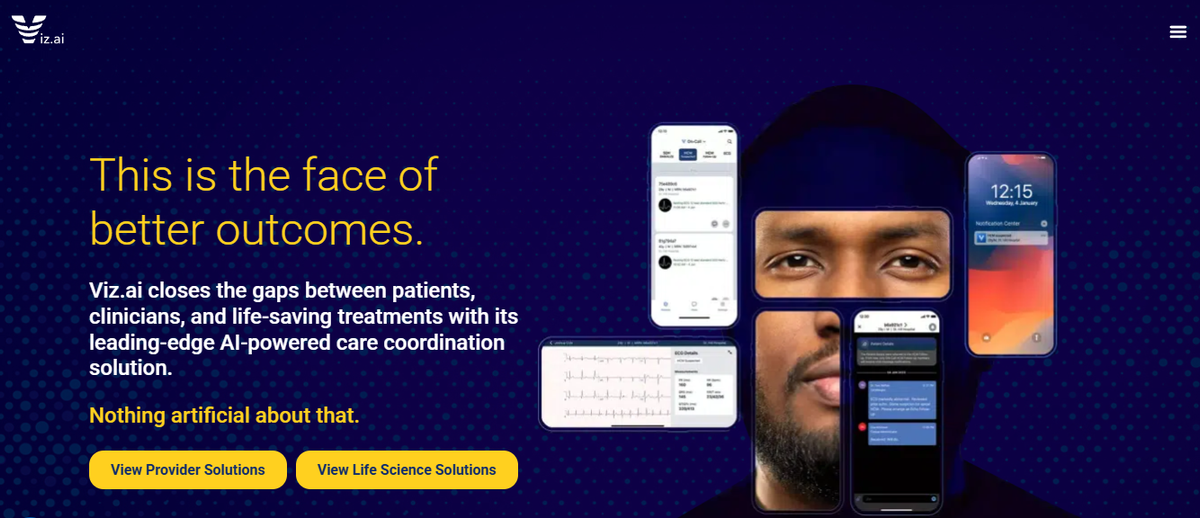
Viz.ai is a medical imaging company based in San Francisco, California, specializing in applying artificial intelligence in healthcare. The company uses advanced deep learning to quickly relay information about stroke patients to specialists who can treat them. They have also introduced a module that helps control the influx of patients during COVID-19, allowing medical professionals to rank the severity level for each patient. As a result, their solution enables a better flow of patients and provides a safer workplace for staff.
Highlights:
- Improving patient management
- Safer environment for medical staff and patients during COVID-19
- Reducing time to treatment and time to diagnosis
5. Microsoft Azure: The Extensive AI Services of Azure
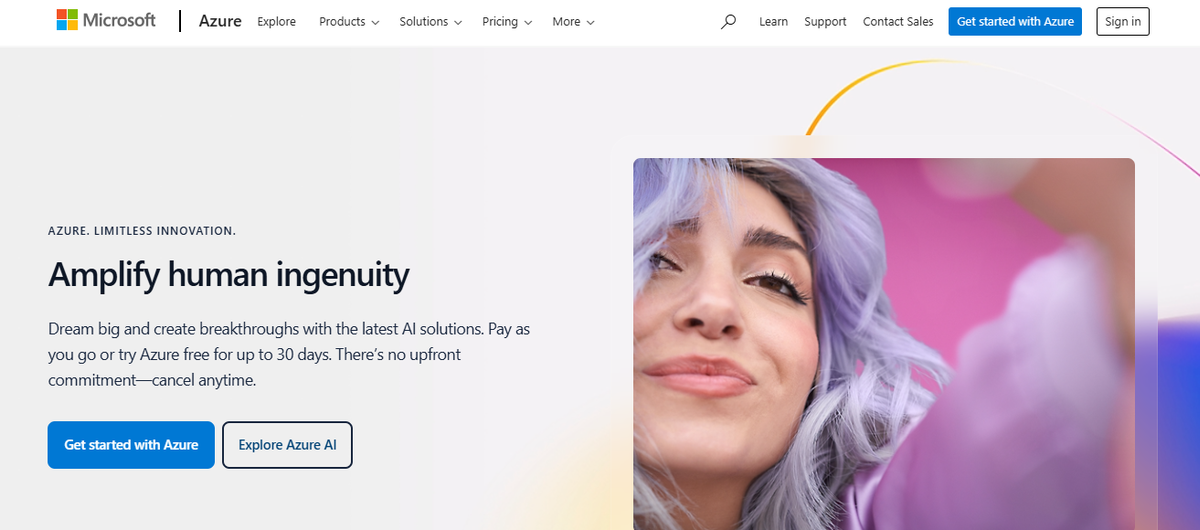
Here are popular Azure AI services:
- Cognitive Services: Provides APIs for content moderation, anomaly detection, and more.
- Cognitive Search: Lets you add AI-powered cloud search into mobile and web applications.
- Azure Machine Learning (AML): Enables you to build, train, and deploy ML models from cloud to edge, supporting the service’s models and custom AI development.
- Bot Services: Offers a serverless chatbot service that can scale on demand.
6. AWS: Amazon's AI and ML Services
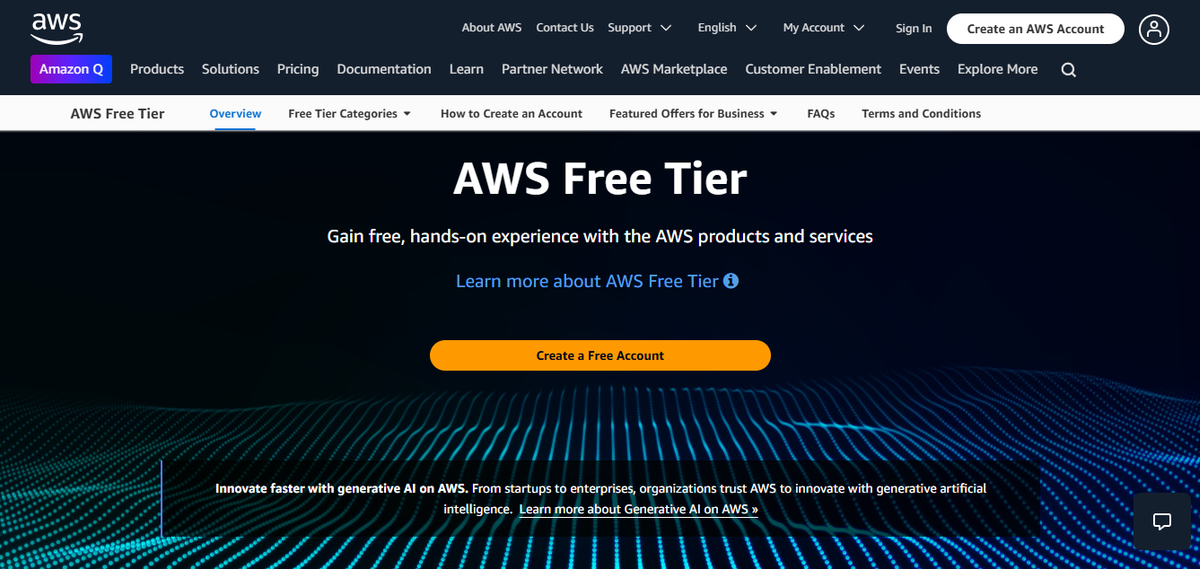
Amazon Web Services (AWS) offers various AI and ML services, including:
- Sagemaker: A fully managed service for machine learning in the cloud. It enables building and training machine learning models and deploying them to a production-ready, hosted environment.
- Lex: Provides features for building chatbots and virtual agents and integrating with new and existing applications. Lex includes natural language capabilities, such as speech recognition, natural language processing (NLP), and speech-to-text conversion.
- Polly: Includes features for creating speech-enabled applications and products. Polly helps convert text into spoken audio.
- Rekognition: Offers computer vision capabilities services, including algorithms pre-trained on datasets Amazon or its partners curated. You can also use algorithms that you have trained on a custom dataset.
7. Google Cloud: A Wide Array of Cloud AI Services
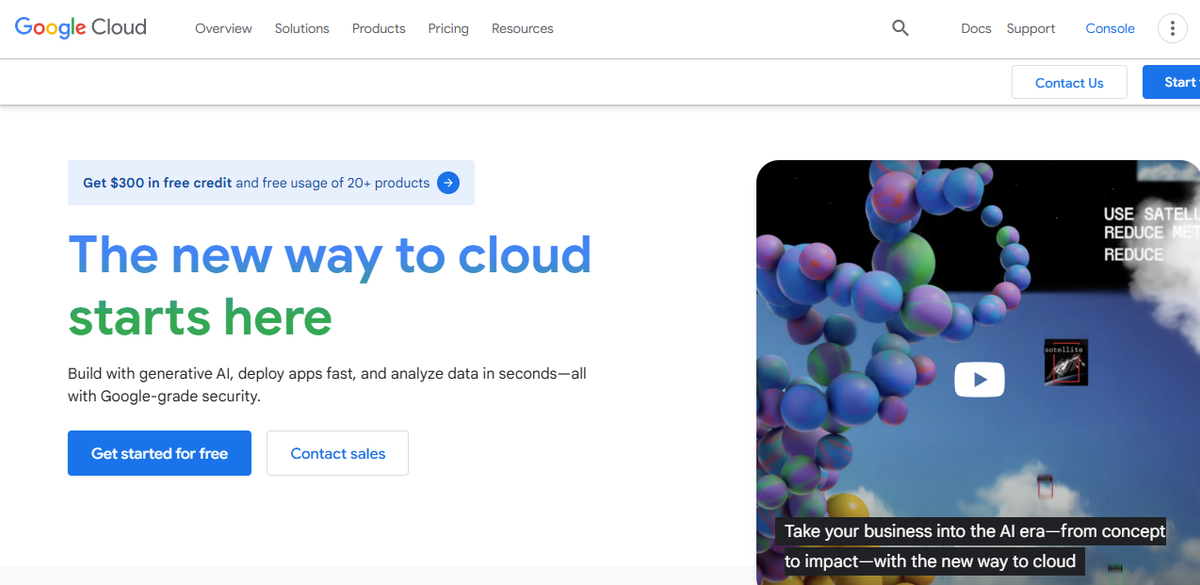
Google Cloud offers various cloud AI services, including:
- AI Platform: Provides capabilities to help you build, deploy, and manage ML models at scale.
- AI Hub: This hosted repository offers plug-and-play AI components, including out-of-the-box algorithms and end-to-end AI pipelines.
- Conversational AI services: These include various services, such as Text-to-Speech, Speech-to-Text, virtual agents, and the Dialogflow platform, to help create conversational actions across applications and devices.
8. Zendesk: AI-Powered Customer Experience Solutions
Zendesk is a top AI as a Service provider for teams that want to improve their customer experience.
Some of our AIaaS capabilities include:
- AI agents that understand and resolve the most sophisticated interactions from end to end.
- Agent copilot that provides support agents with insights, suggested replies, and the ability to execute agent-approved actions.
- AI-powered QA that analyzes 100 per cent of support interactions to highlight areas of improvement and churn risks.
- AI-powered WFM that empowers teams with AI-powered forecasting and scheduling and real-time performance reporting.
Zendesk AI infuses CX intelligence into every interaction, allowing teams to:
- Manage high customer demand
- Streamline workflows
- Boost agent performance and productivity
- Increase customer loyalty
9. Domo: No-Code AI for Business Intelligence
Domo’s comprehensive analytics and business intelligence platform is even more potent by its AI Service Layer. With this technology, your company can access AI tools for data preparation and analysis, automation, forecasting, and more, paired with Domo’s robust data governance and security. Domo’s AI capabilities include:
- Generative AI, using natural language processing
- (NLP) and large language models (LLMS), machine learning, and predictive analytics, to name a few.
Domo’s AI framework and no-code option make it easy for business users, data scientists, and developers to manage and deploy models and draw meaningful insights through visualizations. The flexible, customizable AI solutions ensure you get the best fit for your business.
10. MonkeyLearn: Tools for Text Analytics
MonkeyLearn helps businesses clean, label, and visualize data in one place. This text analytics AI platform is simple to use, featuring intuitive, no-code tools and pre-trained models. It also offers:
- Easy ML model customization for sentiment analysis
- Data classification by topic
- Entity extractors
With a simple point-and-click interface, users can quickly import data, define tags, and create dashboards to track model performance and gain insights.
11. SAP Business Technology Platform: AI for Business Applications
The SAP Business Technology Platform (SAP BTP) includes low-code app builders and automation solutions for developers and business experts. SAP’s Integration Suite offers pre-built integrations, connectors, and APIs that help connect your tools for more efficient automation and data analytics.
SAP’s Business AI copilot, Joule, assists organizations with core business processes such as:
- Human resources
- Procurement and supply chain
- Finance and ERP
- Sales and marketing
- IT
You’ll find AI solutions to help your business identify new growth opportunities within the market, boost sales, and enhance customer service.
12. Oracle: AI Solutions for Business
Oracle offers numerous AI services through its data platform and cloud applications, including:
- Document analysis
- Forecasting/predictive analytics
- Anomaly detection
- Digital assistants
Business users can access Oracle’s built-in database tools and algorithms to build and deploy ML models and create more accurate and relevant generative AI responses. Oracle’s digital assistant lets businesses choose from pre-built conversational agents and customize them for text, voice, or chat-based interfaces. It also has speech-to-text capabilities to convert spoken language into text for greater accessibility.
13. SAS: AI for Data Management and Analytics
SAS Viya is the company’s data and AI platform, providing end-to-end solutions for every data lifecycle stage. Its centralized platform and intuitive interface make it accessible to more members of your organization, enhancing collaboration.
With Viya, you can quickly integrate and prep data from numerous sources and develop models using automated engineering. SAS helps businesses deploy and manage analytics and AI-powered models, offering features like forecasting to predict outcomes and SAS Econometrics to simulate different business scenarios using data.
14. IBM Watson: AI Solutions for Business
With IBM Watson, businesses can choose from a comprehensive set of AI tools to:
- Automate business processes
- Build virtual assistants
- Predict outcomes
This AI platform is accessible, with no coding or tech experience needed to build, train, and deploy ML models in IBM Watson Studio. It also offers companies several pre-built chatbots and conversational interface options, like Watson Assistant, for fast and easy bot implementation on websites, apps, and other channels.
IBM Watson applies to businesses looking to perform more advanced text analytics with Watson Natural Language Understanding (NLU). This AI tool uses deep learning to extract:
- Sentiment
- Classification
- Categories
- Keywords
- Syntax
- Other meanings from unstructured text
15. H2O.ai: Automated Machine Learning for Enterprises
H2O.ai is designed for enterprise-level businesses and offers on-premise and cloud-based AI solutions. Driverless AI, its automated ML platform, helps data scientists work more efficiently on projects by reducing complexity and increasing accuracy across the entire data lifecycle.
The platform automates model deployment, validation, documentation, and visualizations to improve performance and interpretation. H2O also offers user-friendly interfaces so those without data science expertise can still access AI capabilities. Some beginner tech knowledge is still needed.
16. OpenAI
You’ve likely heard of OpenAI’s generative AI tools, Chatgpt and Dall-E, but it's AIaaS offers much more. OpenAI’s cloud-based AI services and models help developers, too.
Some examples include:
- GPT-4: This language model uses natural language processes and generative AI. It is available through an API, allowing developers to build custom AI applications.
- OpenAI Codex: An AI model designed for code generation, it assists developers in writing code more efficiently.
- OpenAI DALL-E: This creates unique visual content from text inputs.
From natural language processing to code generation and image creation, OpenAI’s AIaaS empowers developers to leverage the latest advancements in AI.
Related Reading
- AI Infrastructure
- MLOps Tools
- Machine Learning Inference
- Artificial Intelligence Cost Estimation
- AutoML Companies
- Edge Inference
- LLM Inference Optimization
Is an AI as Solution Right for You?

Before considering AI as a Service, assess your process to determine whether it can be easily defined with rules. If yes, traditional automation might be a better fit for your goals.
There’s no need to complicate things by introducing AI into a process that is straightforward enough to be automated with robotic process automation or other legacy technologies.
Testing the AIaaS Product: What’s the Vendor’s Trial and Security Process?
Like any other software solution, you should test AIaaS products to ensure they fit your business needs. Look for a vendor that allows you to test the product with your data. Any AIaaS platform should also be able to answer your data security questions transparently.
API Security: Does the Product Have a Secure API?
Before deciding on an AIaaS vendor, check out any data compliance rules you may have internally and the vendor's SOC 2 credentials. This will help ensure that your organization’s data will be secure when using the product.
Start Building with $10 in Free API Credits Today!
Inference delivers OpenAI-compatible serverless inference APIs for top open-source LLM models, offering developers the highest performance at the lowest cost in the market. Beyond standard inference, Inference provides specialized batch processing for large-scale async AI workloads and document extraction capabilities designed explicitly for RAG applications.
Start building with $10 in free API credits and experience state-of-the-art language models that balance cost-efficiency with high performance.
Related Reading
- LLM Serving
- LLM Platforms
- Inference Cost
- Machine Learning at Scale
- TensorRT
- SageMaker Inference
- SageMaker Inference Pricing
Own your model. Scale with confidence.
Schedule a call with our research team to learn more about custom training. We'll propose a plan that beats your current SLA and unit cost.





